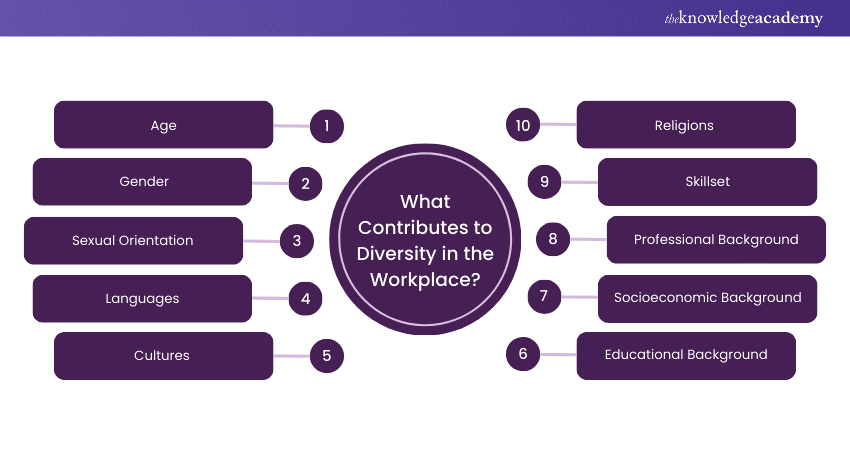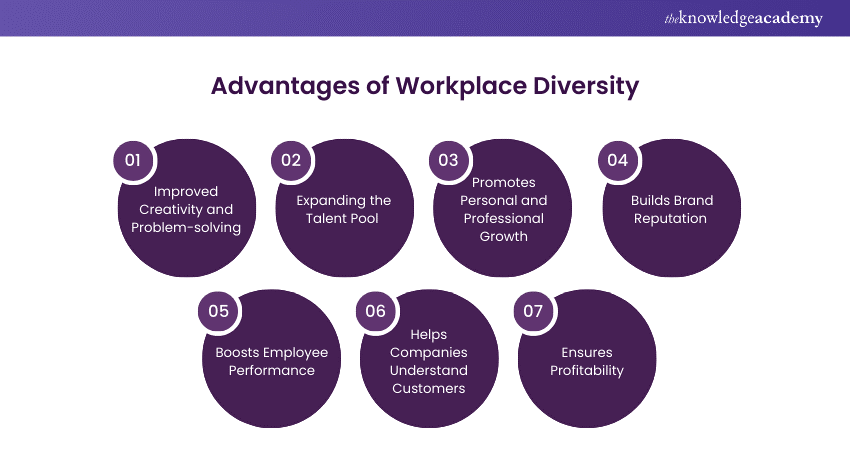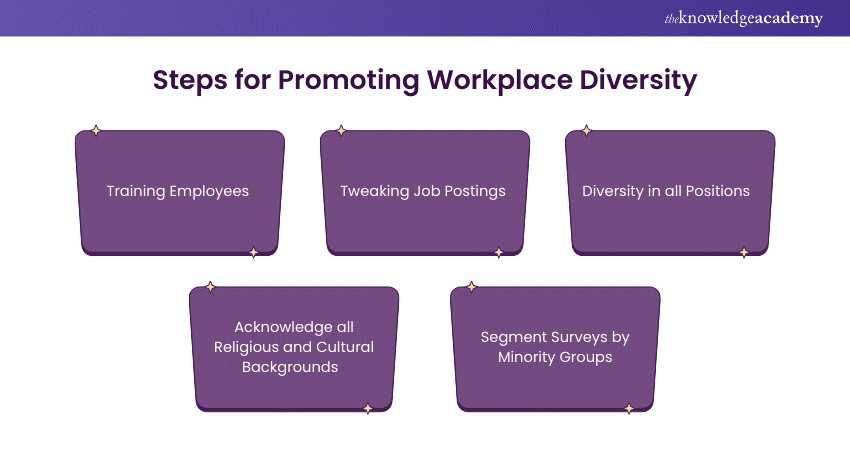We may not have the course you’re looking for. If you enquire or give us a call on 01344203999 and speak to our training experts, we may still be able to help with your training requirements.
Training Outcomes Within Your Budget!
We ensure quality, budget-alignment, and timely delivery by our expert instructors.

A workplace is a vibrant melting pot of diverse mindsets which come together to build the foundation for an organisation’s long-term success. Diversity not only uncovers a broad range of talents within a team but also fosters innovative collaborations resulting in out-of-the-box ideas.
According to a recent study, organisations with above-average total diversity, measured with six dimensions of diversity (Industry, migration, career path, education, gender, age), had 19% points higher innovation revenues. This blog explores What is Diversity by delving into the importance, advantages and challenges about workplace diversity.
Table of Contents
1) What is diversity in the workplace?
2) Importance of diversity in the workplace
3) Advantages of Diversity in the Workplace
4) Challenges of Achieving Diversity in the Workplace
5) How to promote diversity in the workplace
6) Conclusion
What is Diversity in the Workplace?
Workplace diversity is defined as an element of company culture that includes employees of different age, genders, sexual orientations, languages, cultures, religions and skills. It also includes people of different professional, socioeconomic and educational backgrounds.
Enabling diversity in the workplace means making extra effort to employ a broad cross-section of people from various demographics.

Importance of Diversity in the Workplace
As the global population becomes increasingly mobile, diversity is now a vital factor in most communities. By encouraging varying points of view and disruptive thought-processes, a company ensures that it doesn’t become stagnant or complacent.
Diversity goes together with two other concepts:
a) Inclusion: Not only do companies employ professionals from different demographic groups, but they are treated equally. This includes paying the same wages, providing equal learning opportunities, and equitable sharing of workloads.
b) Equity: Through proactive action, companies level the playing field between different demographics. For example, every employee is offered the same learning opportunity, but education is sponsored for those who were incarcerated.
The trio of diversity, inclusion, and equity helps to build a workplace that’s conducive and welcoming to every employee. This opens the company up to the best talents without bias and ensures positive client satisfaction.
Advantages of Diversity in the Workplace
Diversity is the key to unlocking not just productivity but also creativity in the workplace. Consider these major advantages that workplace diversity can offer to organisations

Improved Creativity and Problem-solving
Diversity in the workplace is proven to increase creativity by bringing people from different background and mindsets together. Exposure to different cultures can promote workplace innovation.
By introducing teams to multiple new perspectives, diversity in the workplace can expand a company’s decision-making strategies, problem-solving skills and overall effectiveness.
Expanding the Talent Pool
Gender-diverse teams often outperform homogeneous teams in terms of sales, profitability, as well as budget and time management.
In recent years, increasing number of job seekers reported diversity as an important factor for evaluating a company. This is why embracing diversity in the workplace can attract top talent and result in a skilled workforce that significantly boosts business growth. Providing NLP Training can further enhance communication and understanding among a diverse workforce, promoting a more inclusive and collaborative environment.
Bolster your workforce with our Team And Management Ethics Course – Sign up now!
Promotes Personal and Professional Growth
Diversity in the workplace promotes professional growth by exposing employees to different approaches towards work, different perspectives and skills. Essentially, working in a diverse group encourages employees to expand their learning and broaden their perspectives.
Additionally, learning to accept different points of view can improve active listening skills and help cultivate empathy resulting in a stronger and healthier company culture and work environment.
Builds Brand Reputation
Recent trends suggest that customers, especially Gen Z customers, pay close attention to diversity and inclusion policies of companies and makes their choices based on it.
Accordingly, companies can build excellent reputation by:
a) Focusing on marketing efforts related to diversity, equity, and inclusion.
b) Openly addressing diversity issues and establishing an inclusivity-focused brand voice.
c) Donating to organisations that promote inclusivity and diversity.
d) Customising products and services for diverse customer groups.
Boosts Employee Performance
There’s no denying the importance of workplace diversity in increasing employee satisfaction. Employees that feel accepted and heard are much more likely to be satisfied with their jobs. This is important because job satisfaction is directly related to job performance. Implementing strategies like Neuro-Linguistic Programming can help create an inclusive environment where diverse perspectives are valued and communication is improved.
By empowering the employees, diversity in the workplace can promote them to put their best foot forward, resulting in greater employee engagement, performance and productivity.
Helps Companies Understand Customers
It's safe to assume that any customer base will consist of people from different social backgrounds. This is why diversity in the workplace can help a company better understand its customers.
By having a team of diverse professionals, the company can gain a wider understanding of customers’ needs. People are more inclined to interact with a business if it makes them feel seen and represented.
Ensures Profitability
Based on the above-mentioned points, it’s clear that diversity in the workplace helps acheive more profits for companies. This is achieved through improved talent hire, understanding consumer bases, strengthened brand reputation, and increasing employee productivity.
As such, workplace diversity supports a company’s financial health and helps accelerate business growth.
Looking to diversify your business and make it more inclusive? Learn about it through an Equality and Diversity course
Challenges of Achieving Diversity in the Workplace
Despite the overwhelming benefits of diversity in the workplace, there are a few challenges in achieving it:
Communication Issues
When people from different backgrounds work in the same place, communication can become difficult. From language barriers to age differences, these communication issues can lead to misunderstandings, resulting in decreased employee productivity.
Workplace Discrimination
No matter how much diversity is promoted in workplaces, some employees may still have cognition biases. For example, in a male-dominated industry, some employees may doubt their female colleagues’ credibility.
This can result in discriminatory behaviour and hostility within the team. This is where diversity training programs for employees can help eliminate unconscious biases.
Weak Performer Retention
It's important that crucial a company doesn’t hold on to employees just to increase diversity points. Underperforming, or toxic employees doesn’t bring much value to a business.
For this reason, it’s important that employees are evaluated based on their performance, skills and qualifications, instead of the diversity factor alone.
Clash of Opinions
Because of the distinct upbringing, experiences and mindsets, diverse employees may have conflicting opinions. Conflicting opinions can cause tension and failure to find a common ground can negatively affect a company’s decision-making processes.
Implementing Diversity Measures
Achieving diversity in the organisation can be a big challenge if a company lack resources and support from the team. Crafting a detailed diversity implementation plan will require lots of time, thought and resources.
This plan should include current employee demographics, diversity vision and goals, as well as roles and responsibilities of each department.
How to Promote Diversity in the Workplace?
Even though the road to achieving diversity in the workplace is long and bumpy, the following tips can help ease the way:

1) Training Employees
It’s vital that a company redefines the hiring process and ensures that the employees are on board with it. Training employees in diversity enables them to develop and improve the required skills to successfully hire more culturally diverse employees.
2) Tweaking Job Postings
Ideally, job postings should reflect the focus on promoting diversity in the workplace. For example, if a company is looking for female candidates, a gender-neutral job description can help. It’s also important to mention company values, such as equality, to attract underrepresented candidates.
3) Diversity in all Positions
Companies need to look at the senior leadership teams and assess how many of them come from underrepresented groups. Despite having hundreds of underrepresented employees, if only a couple of them are in leadership positions, it’s time to rethink the workplace diversity strategy.
4) Acknowledge all Religious and Cultural Backgrounds
If the employees come from different religious and cultural backgrounds, promote it’s important to represent them by accommodating their cultural or religious practices. For example, different religious festivals can be celebrated in office.
5) Segment Surveys by Minority Groups
Employee satisfaction & engagement surveys can be segmented by minority groups. This will highlight the unique experience that employees from minority groups have at the workplace, and spot problem areas that should be addressed.
Conclusion
Diversity in the workplace is about maintaining a workforce of people with varying backgrounds, mindsets, perspectives, abilities and lifestyles. Not only is diversity a vital element of a strong company culture and easier recruitment, but it also drives profit and innovation.
Looking to upgrade your business’ diversity and equality factor? Our CMI Level 7 Award In Strategic Approaches To Equality, Diversity And Inclusion Training Course is here to help - Sign up now!
Frequently Asked Questions

Workplace diversity can be classified into four major types:
Internal Diversity (includes race, age, ethnicity, sexual orientation, gender identity etc.), External Diversity (language proficiency, educational background, socioeconomic status etc.), Organisational Diversity (Responsibilities, job titles, expertise) and world View Diversity (perspectives, cultural norms, beliefs etc.)

The four C’s of diversity are:
a) Careers
b) Connections
c) Community
d) Capital

We can show respect in a diverse workplace by acknowledging biases, respecting religious and cultural holidays, encouraging innovation and inviting out-of-the-box inputs. Additionally, lunchtime is good for bonding and avoiding demeaning language should be mandatory.

The Knowledge Academy takes global learning to new heights, offering over 30,000 online courses across 490+ locations in 220 countries. This expansive reach ensures accessibility and convenience for learners worldwide.
Alongside our diverse Online Course Catalogue, encompassing 17 major categories, we go the extra mile by providing a plethora of free educational Online Resources like News updates, Blogs, videos, webinars, and interview questions. Tailoring learning experiences further, professionals can maximise value with customisable Course Bundles of TKA.

The Knowledge Academy’s Knowledge Pass, a prepaid voucher, adds another layer of flexibility, allowing course bookings over a 12-month period. Join us on a journey where education knows no bounds.

The Knowledge Academy offers various Equality and Diversity Training Courses, along with Team Development training and Corporate Social Responsibility CSR Training. These courses cater to different skill levels, providing comprehensive insights into developing Business Skills.
Our Business Skills Blogs cover a range of topics related to Diversity in the workplace, offering valuable resources, best practices, and industry insights. If you are looking to implement diversity in your company, The Knowledge Academy's diverse courses and informative blogs have got you covered.
Upcoming HR Resources – Learn about Human Resources Batches & Dates
Date
 CMI Level 7 Award in Strategic Approaches to Equality, Diversity and Inclusion Training Course
CMI Level 7 Award in Strategic Approaches to Equality, Diversity and Inclusion Training Course
Fri 28th Feb 2025
Fri 4th Apr 2025
Fri 27th Jun 2025
Fri 29th Aug 2025







 Top Rated Course
Top Rated Course



 If you wish to make any changes to your course, please
If you wish to make any changes to your course, please


